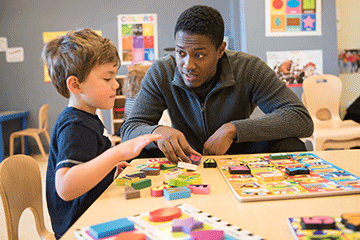Bulletin News

03/23/2021
SUNY Cortland’s Literacy Department faculty will host two experts to deliver keynote speeches on how to apply greater cultural awareness and anti-oppressive teaching approaches to nurture brilliant minds in diverse classrooms on Saturday, April 3.
Gholnecsar “Gholdy” Muhammad, an associate professor at Georgia State University and the author of Cultivating Genius: An Equity Framework for Culturally and Historically Responsive Literacy, will give the opening keynote address for the fifth annual SUNY Cortland Literacy Department Conference from 9 a.m. to 2 p.m.
Jevon Hunter, who is the Woods-Beals Endowed Chair for Urban Education at SUNY Buffalo State College, will offer the closing keynote.
The Zoom conference, on the theme of “Cultivating Self-Awareness with Critical Literacies Through Anti-Racist and Anti-Oppressive Pedagogies,” is free and is designed for faculty, students, K-12 teachers and other educational stakeholders.
Individuals who wish to participate in the conference must register online by Thursday, March 25. More information is available on the conference website.
In addition to the two keynote speakers, the event will offer presentations, workshops, panels and discussion groups featuring the scholarship of SUNY Cortland faculty and students as well as the faculty and students from other colleges, universities and K-12 schools.
“We seek to create space for attendees to examine their own understandings, beliefs, and biases about literacy teaching and learning,” said Katarina Silvestri, assistant professor of literacy and a conference organizer. “We hope to introduce attendees to teaching practices that develop critical literacy practices with their students.”
Muhammad is an associate professor of language and literacy at GSU. She also directs the GSU Urban Literacy Collaborative and Clinic. Muhammad studies Black historical excellence within educational communities with goals of reframing curriculum and instruction today.
“We want to help cultivate students who will not be neutral on oppression or students who would contribute to more oppression in the world,” Muhammad said in a Jan. 28, 2020 edition of Education Week. “Instead, we want to cultivate young people who, across the course of their lifetimes, will disrupt, disquiet, or unhinge oppression.”
Her scholarship has appeared in leading educational journals and books. She was honored with the 2014 National Council of Teachers of English, Promising New Researcher Award, the 2016 NCTE Janet Emig Award, the 2017 GSU Urban Education Research Award, the 2018 UIC College of Education Researcher of the Year and the 2020 American Educational Research Association’s Division K Early Career Award.
She works with teachers, leaders, parents and young people across the United States and South Africa in best practices in culturally and historically responsive instruction.
Hunter chairs the Social and Psychological Foundations – Adult Education Department at Buffalo State. A literacy justice educator, his work is centered around the lived and living experiences of Black youth. His interests are mainly collaborative, having partnered with numerous school districts and educational organizations across New York state. Hunter’s collaborations aim to share the benefits of asset-based, justice-oriented pedagogies in the classroom such as multicultural education, culturally relevant pedagogy, culturally sustaining pedagogy, and anti-racist pedagogy. He has been working side-by-side with African, African descended, and urban youth, designing literacy activities that engage young people in emancipatory, restorative and liberating literacy practices.
Hunter has been recognized for his work with various awards, including a post-doctoral fellowship from the Ford Foundation. He regularly presents at local, state and national/international conferences Currently, he is working on a book manuscript that showcases the literacy practices, activities and outcomes of Buffalo’s Black youth.
Conference sponsors also include Cortland Auxiliary, the School of Education Dean’s Office, Cortland's Urban Recruitment of Educators (C.U.R.E.), the Provost's Office in collaboration with the Cortland College Foundation through a Faculty Development Center Small Grant, Campus Arts and Lecture Series Grant (CALS), Foundations and Social Advocacy Department, Childhood and Early Childhood Education Department, Center for Gender and Intercultural Studies and the English Department.
For more information, contact Silvestri at 607-753-5567.

